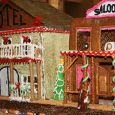The Gift of South Dakota
Subscriptions to South Dakota Magazine make great gifts!
Subscribe today — 1 year (6 issues) is just $29!
Christmas: Past, Present and Future
Dec 19, 2011
Here is a basic problem of modern political philosophy and economics that is appropriate for the season: was Scrooge A a man of modern virtue? By Scrooge A, I mean Scrooge before his Christmas Eve enlightenment. By modern virtue, I have in mind the Machiavellian sense of effective virtue, that is, a set of habits that is efficiently if not ruthlessly productive.
The answer is obviously yes. Scrooge A was about as efficiently productive as it is possible for a human being to be, as least when it comes to cold, hard, cash. Cruel as he was, he had money to lend and a job for poor Bob Cratchit.
Dickens's Christmas Carol is one of the most perfect yarns ever spun. This is due in large part to his sublimation of Christianity. The tale is, to be sure, full of ghosts; but, apart from the word Christmas itself, I think there is not the slightest mention of the Holy Ghost. Dickens writes as if he were trying to smuggle the Gospel onto the courthouse grounds under the watchful eyes of our Supreme Court. This has the paradoxical effect of making the Christian message of redemption all the more compelling.
A second aspect of its perfection lies in the marvelous splitting of time into past, present, and future spirits. All three ghosts are, of course, one and the same ghost: Christmas itself, a religious festival incarnate (or almost incarnate, the ghosts being more or less vaporous and visible only to Scrooge). But Christmas appears differently from the three temporal points of view, thus grounding itself in the most basic existential fact of human life. The past and present are history. Only the future may be redeemed.
Last, but not least, Dickens shows the flaw in modern virtue without rejecting modern virtue. Anyone can see that there is something desperately wrong with the way that Scrooge A is living. Sipping warmed up broth in his frigid chambers, without the comforts of love, friends, or family, what is the point of being rich? On the other hand, it is precisely the efficiency of Scrooge A that makes his transformation so wonderful. Scrooge B can afford to send the Cratchits a gargantuan turkey. He can afford to redeem his sister's love by changing his nephew Fred's circumstances. And he can afford to save poor Tim. It is worth mentioning that he can also afford to make his place of business and his home a good deal more comfortable.
I have heard it said that Dickens more or less revived and profoundly shaped our later celebration of Christmas. It is certainly part of an interesting shift in the Christian calendar. The most important Christian festival ought to be Easter, for the resurrection constitutes the essential promise of the Gospel: as Christ walked out of the tomb, those who believe in Him may do likewise. Christmas has come to overshadow Easter, even among the most pious Christians in the modern world. Because of Scrooge A-like modern virtue, we can afford to be very generous when a Scrooge B-like mood hits us.
Say what you want about the evils of capitalism, it has done more to supply the hearths of the poor than dropping alms into collection plates ever did. More Tiny Tims of the developed world have been saved by the power and prosperity of modern civilization than ever were by a ghost sprinkling Christmas cheer. But A Christmas Carol is not about their salvation. It is about Scrooge's salvation.
I have seen a lot of versions of A Christmas Carol. My favorite by far is the version starring Patrick Stewart. No one has presented the contrast between the redeemed and unredeemed Scrooge so well. When he finds himself alive on Christmas morning, he suddenly seems to strangle and cough. He has not laughed in so long that he can hardly remember how to do it. It also adds a scene in which Scrooge attends a Christmas morning church service. He is unaccustomed to the venue. The usher has to remind him to take off his top hat. As he squeezes into a pew, he tries to sing but doesn't know the words. As the man next to him kindly shares his hymnal, Scrooge begins to rejoin humankind. When, to everyone’s astonishment, he shows up at Fred's for Christmas dinner, he knows that the person who has to accept him is not Fred but Fred's wife. He says to her: "can you forgive a stupid old man who doesn't want to be left out in the cold anymore." I tear up just typing those words.
All this reminds us that modern virtue, for all its power, would be a very poor thing without Christian virtue. Merry Christmas.
Dr. Ken Blanchard is a professor of Political Science at Northern State University and writes for the Aberdeen American News and the blog South Dakota Politics.











Comments